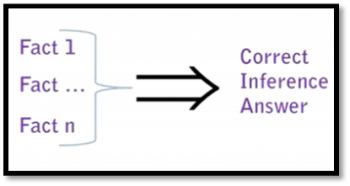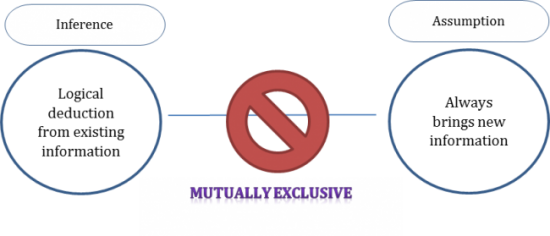
What is the Purpose of writing this article?
The purpose of this article is to clearly bring out the difference between the Inference and Assumption so that any source of confusion can be eliminated.
Some students are confused between inference and Assumption because the phrase “Must be true” is used in both question types. We have also seen that some students do face problems in identifying one from the other.
Let’s begin with the definitions of both the terms: Inference and Assumption.
Inference

An inference is a piece of information which can be logically deducted from the given set of statements. In GMAT, an inference could be a logical deduction from a single statement or from a combination from two or more statements.
Let’s take an example:
Everyone who reads this article will be more informed about Inference and Assumption. Rahul read this article.- Inference: Rahul is more informed about Inference and Assumption
This is an example of a combination inference where two or more statements are combined to produce the correct answer choice. In this specific case, the first statement lays out a general rule of the form: If X, then Y i.e. If one reads this article, then he will be more informed about Inference and Assumption.
The next statement about Rahul states that ‘X’ statement is satisfied in case of Rahul. Therefore, combining these statements, we can make an inference that Rahul is more informed about Inference and Assumption.
Assumption

An assumption is a hidden or an unstated premise. There are two keywords in this definition: “hidden” and “premise”.
- Being a premise means that the assumption must be true for the conclusion to hold true
- “Hidden” means it cannot be logically derived from existing information i.e. it must present some new information. This is because there is no need to assume a thing, which can be logically derived from existing information.
- Assumption: Rahul has read every mail that he has received so far.
Using the same terminology we used in the previous example: In this case, we are given “If X, then Y” and that Rahul received this article in his email. These two statements are, then, taken to conclude that Y holds for Rahul.
But within the context of the passage, we know that to conclude Y, X must hold. Therefore, Rahul must have read the article. However, we are only given that Rahul received this article in his email.
Therefore, the underlying assumption is that Rahul has read every mail that he has received so far.
Point of Confusion
We can see from the definitions above that there are some critical differences between an inference and an assumption:
|
Inference |
Assumption |
| Question stem Structure – If the statements above are true, which of the following must be true? | Which of the following is an assumption on which the argument depends? |
| Inference is a statement which must be true, if the given information is true | Assumption is a statement which must be true, for the given information to be true; in other words, for the conclusion to hold true. |
| An inference can always be logically deducted from the given information | An assumption can never be logically deducted from the given information – It contains some new information |
| It’s very rare for an inference question to have a conclusion in the passage or the question stem | An assumption question necessarily needs to have a conclusion in the passage or the question stem |
If we focus on the second point of difference above, we can see that an inference can never be same as an assumption. In other words, they are mutually exclusive sets. There is no overlap.
An OG Inference question with a conclusion(OG12 q#56)
In the third point above, we have stated that inference question typically don’t contain a conclusion. Below is the only Inference question that we have come across in OG questions that contains a conclusion. We present here to illustrate that even when an inference question contains a conclusion, there is no confusion between an inference and an assumption.
The fewer restrictions there are on the advertising of legal services, the more lawyers there are who advertise their services and the lawyers who advertise a specific service usually charge less for that service than the lawyers who do not advertise. Therefore, if the state removes any of its current restrictions, such as the one against advertisements that do not specify fee arrangements, overall consumer legal costs will be lower than if the state retains its current restrictions.
If the statements above are true, which of the following must be true?
- Some lawyers who now advertise will charge more for specific services if they do not have to specify fee arrangements in the advertisements.
- More consumers will use legal services if there are fewer restrictions on the advertising of legal services.
- If the restriction against advertisements that do not specify fee arrangements is removed, more lawyers will advertise their services.
- If more lawyers advertise lower prices for specific services, some lawyers who do not advertise will also charge less than they currently charge for those services.
- If the only restrictions on the advertising of legal services were those that apply to every type of advertising, most lawyers would advertise their services.
The answer to this question is Option C, which one can see, is primarily a logical deduction from the first line of the passage, as underlined below.
The fewer restrictions there are on the advertising of legal services, the more lawyers there are who advertise their services, and the lawyers who advertise a specific service usually charge less for that service than the lawyers who do not advertise. Therefore, if the state removes any of its current restrictions, such as the one against advertisements that do not specify fee arrangements, overall consumer legal costs will be lower than if the state retains its current restrictions.
In this case, since option C is a logical deduction from available information, it cannot be an assumption.
Take Away

Thus, from our discussion above, we can ‘infer’ that “Inference” and “Assumptions” are two mutually exclusive sets i.e. a statement cannot be both an inference as well as an assumption for the same given passage. Why? Because while an Inference will always be logically deductible from the given information, an assumption will never be.














